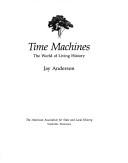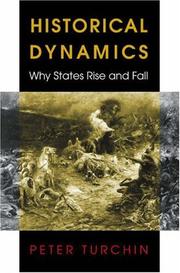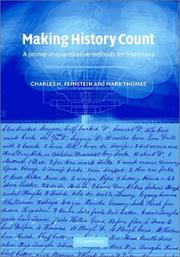| Listing 1 - 10 of 16 | << page >> |
Sort by
|
Book
ISBN: 2072719348 2072491460 Year: 2013 Publisher: Paris : Gallimard,
Abstract | Keywords | Export | Availability | Bookmark
 Loading...
Loading...Choose an application
- Reference Manager
- EndNote
- RefWorks (Direct export to RefWorks)
La nuit du 4 août 1789 est au cœur de notre mémoire historique : à Versailles, la France unanime consacre, dans les embrassades et les pleurs, l'abandon des privilèges. Deux siècles après, la "nuit mémorable" nous impose encore l'image de l'unité et de l'homogénéité nationales. Jean-Pierre Hirsch retrace ici les moments et la logique d'une improvisation politique promise à une notoriété universelle. Compromis génial, l'invention du 4 août fonde un ordre politique. Dans les mots seulement? La moisson rentrée, ne pouvait-on garder la semence des privilèges?.
Book
ISBN: 9783110553017 3110553015 Year: 2014 Publisher: Berlin: de Gruyter,
Abstract | Keywords | Export | Availability | Bookmark
 Loading...
Loading...Choose an application
- Reference Manager
- EndNote
- RefWorks (Direct export to RefWorks)

ISBN: 0910050716 Year: 1984 Publisher: Nashville American association for state and local history
Abstract | Keywords | Export | Availability | Bookmark
 Loading...
Loading...Choose an application
- Reference Manager
- EndNote
- RefWorks (Direct export to RefWorks)
Historical models --- Historical museums --- History --- Research
Book
ISBN: 9782877726375 2877726371 Year: 2020 Publisher: Arles : Errance,
Abstract | Keywords | Export | Availability | Bookmark
 Loading...
Loading...Choose an application
- Reference Manager
- EndNote
- RefWorks (Direct export to RefWorks)
Cet ouvrage a pour ambition de dévoiler l'imbrication qui existe entre les deux disciplines. En effet, en France, c'est autour de la question de l'"archéologie" que s'est structuré l'enseignement de l'architecture aux XIXe et XXe siècles. Or, la seconde prend désormais ses distances avec la première et la formation historique, donc archéologique, des jeunes architectes souffre de carences certaines. Les deux disciplines ont pourtant fort à gagner quand elles dialoguent et réfléchissent ensemble. L'objectif de cet ouvrage collectif est de montrer les parallèles possibles entre l'une et l'autre, les ponts permettant l'élaboration de nouvelles approches méthodologiques, sources d'inspiration mais aussi de remises en question
Architecture and archaeology --- Cultural property --- Historical models --- Conservation and restroration.
Book
Year: 2015
Abstract | Keywords | Export | Availability | Bookmark
 Loading...
Loading...Choose an application
- Reference Manager
- EndNote
- RefWorks (Direct export to RefWorks)
historical models --- Gent, Sint-Baafskathedraal --- Het Lam Gods --- Eyck, van, Hubert --- Eyck, van, Jan
Book
ISBN: 9783946217008 Year: 2016 Publisher: Nürnberg Verlag des Germanischen Nationalmuseums
Abstract | Keywords | Export | Availability | Bookmark
 Loading...
Loading...Choose an application
- Reference Manager
- EndNote
- RefWorks (Direct export to RefWorks)
Pure sciences. Natural sciences (general) --- Art --- art [discipline] --- historical models --- natural sciences --- Leibniz, von, Gottfried W.

ISBN: 0691116695 Year: 2003 Publisher: Princeton Princeton university press
Abstract | Keywords | Export | Availability | Bookmark
 Loading...
Loading...Choose an application
- Reference Manager
- EndNote
- RefWorks (Direct export to RefWorks)
Many historical processes are dynamic. Populations grow and decline. Empires expand and collapse. Religions spread and wither. Natural scientists have made great strides in understanding dynamical processes in the physical and biological worlds using a synthetic approach that combines mathematical modeling with statistical analyses. Taking up the problem of territorial dynamics--why some polities at certain times expand and at other times contract--this book shows that a similar research program can advance our understanding of dynamical processes in history. Peter Turchin develops hypotheses from a wide range of social, political, economic, and demographic factors: geopolitics, factors affecting collective solidarity, dynamics of ethnic assimilation/religious conversion, and the interaction between population dynamics and sociopolitical stability. He then translates these into a spectrum of mathematical models, investigates the dynamics predicted by the models, and contrasts model predictions with empirical patterns. Turchin's highly instructive empirical tests demonstrate that certain models predict empirical patterns with a very high degree of accuracy. For instance, one model accounts for the recurrent waves of state breakdown in medieval and early modern Europe. And historical data confirm that ethno-nationalist solidarity produces an aggressively expansive state under certain conditions (such as in locations where imperial frontiers coincide with religious divides). The strength of Turchin's results suggests that the synthetic approach he advocates can significantly improve our understanding of historical dynamics.
Historical sociology --- Historische sociologie --- Sociologie [Historische ] --- Sociologie historique --- Sociology [Historical ] --- Historiometry. --- History --- Mathematical models. --- Historiometry --- Historiometrics --- Biography --- Psychohistory --- Historical models --- Mathematical models --- Methodology --- Psychological aspects --- Statistical methods
Book
ISBN: 9782840505457 2840505452 Year: 2008 Volume: *2 Publisher: Paris : Presses de l'Université Paris-Sorbonne (PUPS),
Abstract | Keywords | Export | Availability | Bookmark
 Loading...
Loading...Choose an application
- Reference Manager
- EndNote
- RefWorks (Direct export to RefWorks)
En croisant le regard d'historiens et de spécialistes de la littérature, ce livre se propose, à travers le témoignage des productions textuelles et picturales liées à l'écriture, d'analyser les formes d'appropriation et les usages du passé que les hommes, les groupes sociaux et les institutions des XIe-XVIe siècles ont façonnés. Dans le cadre du " régime d'historicité traditionnel " (R. Koselleck) qui caractérise cette période, passé et présent sont intimement liés ; le passé est à la fois disponible pour formuler et légitimer des besoins nouveaux, perpétuellement soumis aux injonctions d'un présent en quête de discours étiologiques et de schèmes légitimants, mais ces usages apparaissent contraints par les résistances de l'héritage à certaines interprétations, par les prescriptions du cadre discursif adopté et par le risque d'accusation d'un mésusage du passé. A partir de la singulière relation que l'écriture établit entre passé et présent, l'ouvrage indique quelques pistes pour comprendre les systèmes de représentation des dynamiques de transformations sociales communs au Moyen Age et au début des Temps modernes.
Historiography --- Historical models --- Historiographie --- Modèles historiques --- History --- Histoire --- Europe --- Modèles historiques --- Historiographie médiévale --- Littérature et histoire --- Mémoire collective --- Moyen âge
Book
ISBN: 311036834X 3110304090 9783110303858 311030385X 9783110304091 9783110368345 Year: 2014 Publisher: Berlin Boston
Abstract | Keywords | Export | Availability | Bookmark
 Loading...
Loading...Choose an application
- Reference Manager
- EndNote
- RefWorks (Direct export to RefWorks)
Miniature Monuments: Modeling German History offers a series of essays on small-scale models of bombed out cities. Created between 1946 and the present, these plastic renderings of places provide eerie glimpses of destruction and devastation resulting of the air war. This study thus permits fresh angles on post-war responses to the compounded losses of WW II, and it does so through considering these "miniature monuments" (of, among others, Frankfurt, Munich, Schwetzingen, Heilbronn and Hiroshima) in a deep cultural history that interlaces the sixteenth, eighteenth, and twentieth centuries. Three-dimensional renderings in diminutive size have rarely been subjected to rigorous theoretical reflection. Conventionally, models, whether of ruins or intact spaces, have been assumed to be "easily legible"; that is, they have been assumed to be vehicles of the authentic. Yet rubble and other models should be theorized as complex simulacra of abstract realities and catalysts of memories. Miniature Monuments thus tackles a haunting paradox: building ruins. The book elucidates how utterly contingent processes of crumbling and collapse (the English words for the Latin ruina) came to command such great interest in modern Europe that tremendous efforts were taken to uncover, render, and, most of all, recreate ruins.
Historiography --- Historical models. --- History --- Models, Historical --- Models and modelmaking --- Models --- Methodology --- Historiographie --- Modèles historiques --- German history. --- cultural history. --- memory. --- ruins. --- urban history.

ISBN: 0521806631 0521001374 1107131294 0511119771 051107798X 0511561393 113916483X 1280162821 0511204914 051107641X 9780511077982 9780511119774 9780511076411 9781139164832 9786610162826 6610162824 9780521806633 9780521001373 9781107131293 9781280162824 9780511204913 9780511561399 Year: 2002 Volume: *3 Publisher: Cambridge Cambridge University Press
Abstract | Keywords | Export | Availability | Bookmark
 Loading...
Loading...Choose an application
- Reference Manager
- EndNote
- RefWorks (Direct export to RefWorks)
Making History Count introduces the main quantitative methods used in historical research. The emphasis is on intuitive understanding and application of the concepts, rather than formal statistics; no knowledge of mathematics beyond simple arithmetic is required. The techniques are illustrated by applications in social, political, demographic and economic history. Students will learn to read and evaluate the application of the quantitative methods used in many books and articles, and to assess the historical conclusions drawn from them. They will also see how quantitative techniques can open up new aspects of an enquiry, and supplement and strengthen other methods of research. This textbook will encourage students to recognize the benefits of using quantitative methods in their own research projects. The text is clearly illustrated with tables, graphs and diagrams, leading the student through key topics. Additional support includes five specific historical data-sets, available from the Cambridge website.
Historical models --- Historische modellen --- Modellen [Historische ] --- Models [Historical ] --- Modèles historiques --- History as a science --- History --- Historiometry --- Historiography --- Models, Historical --- Models and modelmaking --- Methodology --- Statistical methods --- Models --- #A0309HI --- Historical models. --- Methodology. --- Statistical methods. --- Statistique --- Statistics --- Arts and Humanities --- HISTOIRE --- MODELES HISTORIQUES --- METHODOLOGIE --- METHODES STATISTIQUES --- ETUDE DE CAS
| Listing 1 - 10 of 16 | << page >> |
Sort by
|

 Search
Search Feedback
Feedback About UniCat
About UniCat  Help
Help News
News